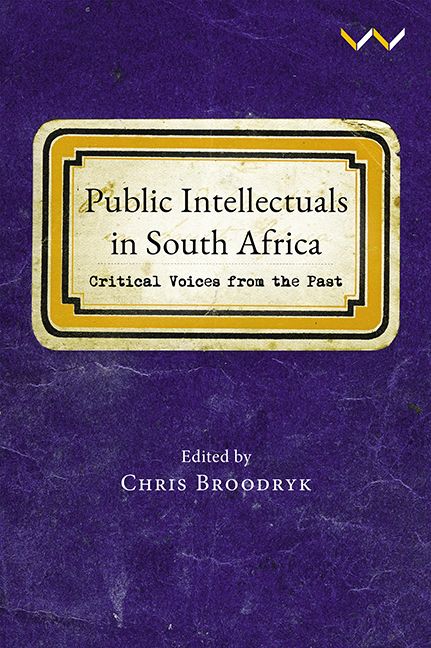Book contents
- Frontmatter
- Contents
- Acknowledgements
- Introduction: The Prismatic Nature of Public Intellectualism
- Chapter 1 Recalibrating the Deep History of Intellectual Thought in the KwaZulu-Natal Region
- Chapter 2 Elijah Makiwane and Early Black South African Public Intellectualism
- Chapter 3 Black Art Criticism in The Bantu World during the 1930s
- Chapter 4 In Conversation with the Nation: Sowetan’s Maverick Editor Aggrey Klaaste
- Chapter 5 William Pretorius and the Public Intellectualism of the Film Critic
- Chapter 6 Cultural Policy and the Arts: Mewa Ramgobin and Public Dialogue
- Chapter 7 ‘Kaalgat Critique’: The Public Intellectualism of Koos Roets as Afrikaans Satirist
- Chapter 8 The Public Intellectualism of Artivist Mandisi Sindo
- Chapter 9 The Janus-Faced Public Intellectual: Dr Thomas Duncan Greenlees at the Institute for Imbecile Children, 1895–1907
- Index
Chapter 1 - Recalibrating the Deep History of Intellectual Thought in theKwaZulu-Natal Region
Published online by Cambridge University Press: 16 July 2022
- Frontmatter
- Contents
- Acknowledgements
- Introduction: The Prismatic Nature of Public Intellectualism
- Chapter 1 Recalibrating the Deep History of Intellectual Thought in the KwaZulu-Natal Region
- Chapter 2 Elijah Makiwane and Early Black South African Public Intellectualism
- Chapter 3 Black Art Criticism in The Bantu World during the 1930s
- Chapter 4 In Conversation with the Nation: Sowetan’s Maverick Editor Aggrey Klaaste
- Chapter 5 William Pretorius and the Public Intellectualism of the Film Critic
- Chapter 6 Cultural Policy and the Arts: Mewa Ramgobin and Public Dialogue
- Chapter 7 ‘Kaalgat Critique’: The Public Intellectualism of Koos Roets as Afrikaans Satirist
- Chapter 8 The Public Intellectualism of Artivist Mandisi Sindo
- Chapter 9 The Janus-Faced Public Intellectual: Dr Thomas Duncan Greenlees at the Institute for Imbecile Children, 1895–1907
- Index
Summary
In the literature that deals with public intellectual activity in SouthAfrica there is a tacit understanding that one of its defining features issustained reading and writing. The literature shares this feature withEuropean understandings of public intellectual activity and has not, to myknowledge, actively considered the possibility of intellectual life insettings without writing. There is further implicit agreement that‘public’ in the phrase ‘public intellectual’refers to the public of the ‘public sphere’, one of the socialimaginaries of a modern democracy. It is the public called into being by thewide circulation of printed texts, the public that must read, consider anddebate its options and make political choices then realised through theballot box.
In South Africa these assumptions about public intellectualism combine withdeeply entrenched ideas about pre-colonial societies as practising timelesstribal culture and relaying oral traditions, the combination therebyprecluding any exploration of pre-colonial intellectual currents andactivities. These combined assumptions foreclose any investigation of howintellectual engagements in oral forms sought to persuade people and toshape political futures, both deep within the eras before colonialism andpersisting into the colonial era. They obscure how such modes of debate anddiscussion overlapped and intersected with early literate forms of publicintellectual activity.
This chapter challenges the assumptions that position thinkers of thenineteenth and early twentieth centuries, who expressed their ideas orallyand who did not write, as atavistic relayers of oral tradition, and theirliterate counterparts – often their very own kin – as modernthinkers engaged in public intellectual life. Members of both seeminglydistinct categories, I argue, were deeply cognisant of the immense changesof their times and both attempted to reconcile the past with the present.People in both categories were critically concerned with the navigation ofchange and the nature of the brokering of the past into the present thateach saw as necessary to navigate that change. This involved drawing onbanks of inherited knowledge, reconciling the old with the new, testingideas and deliberating in multiple settings.
The chapter shows that deliberative activity of this kind was also a featureof life before colonialism. Such activity shows up in thehistorical record wherever significant change had to be navigated.
- Type
- Chapter
- Information
- Public Intellectuals in South AfricaCritical Voices from the Past, pp. 21 - 43Publisher: Wits University PressPrint publication year: 2021

